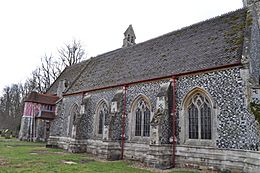West Tofts facts for kids
Quick facts for kids West Tofts |
|
|---|---|
| village | |
 St Mary's Church, West Tofts |
|
| Population | 0 (2001 Census) |
| OS grid reference | TL 8360 9301 |
| Civil parish |
|
| District | |
| Shire county | |
| Region | |
| Country | England |
| Sovereign state | United Kingdom |
| Post town | THETFORD |
| Postcode district | IP24 |
| EU Parliament | East of England |
| UK Parliament |
|
West Tofts is a village in Norfolk, England, that is now empty. It became a "deserted village" a long time ago, in the 1700s, when its land was turned into a large park. People have lived in West Tofts since at least 1391. It's part of an area called Breckland.
In West Tofts, you can still see signs on the ground (called earthworks) where a big house once stood. This house was like a country estate with gardens and a park. It was built before 1797 and later became a rectory, which is a home for a church leader. The house was taken down after World War II, but a wall from its old plant house (called a vinery) is still standing.
The village became officially empty when the British Army took it over during World War II. It became part of the much larger Stanford Battle Area, which is still used today for training soldiers. The area where the village used to be is now called West Tofts Army Camp. Most of this area is owned and controlled by the Ministry of Defence (MoD). You are not allowed to visit without special permission from the Army.
In 1911, a very old stone hand axe was found here. It was about 500,000 years old! Inside the axe, there was a fossil of a sea shell called a Spondylus spinosus. This special axe is now kept at the Museum of Archaeology and Anthropology in Cambridge.
West Tofts Army Camp
There was a camp at West Tofts even before 1935, which was used to house refugees from Belgium. In 1935, the Ministry of Labour, a part of the UK Government, started building a camp for unemployed workers. This camp used Nissen huts, which are special curved metal buildings. At the same time, it also became an army camp. Two World War II-era air raid shelters were also built there to protect people during air attacks.
 | Bayard Rustin |
 | Jeannette Carter |
 | Jeremiah A. Brown |


